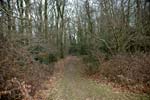Woodland flower species decline
12-08-2005

Woodlands for sale throughout the UK. Call 01727 701330 for current availability in your area.
Vantage Land
01727 701330
www.vantageland.co.uk
Maturing trees are at the root of Britain's woodland flower decline, depriving them of light. The study, Long Term Ecological Change in British Woodland, 1971 to 2001, found the number of different plants found at specific sites in 103 native woods in England Wales and Scotland had fallen by a third in the past 30 years.
The study also cited a rising deer population, pollution and climate change as further causes making the task of remedying the situation even harder. Woodland plants such as yellow archangel, sanicle, herb robert, sweet violet and oxslip were among 56 out of 72 species that had become significantly less common.
Ecologists warn that the loss of species would have a knock-on effect on insects and other wildlife further up the food chain.
The Forestry Commission is to continue reducing non-native trees in its plantations and controlling livestock grazing to help to reverse the decline of wildflowers.
Thirteen of the surveyed woodlands were north of the border, but the Forestry Commission Scotland said more research was needed to ascertain how different the situation might be compared with the rest of the UK.
A decline in the management of native woods, which occurred in the twentieth century alongside greater commercial forestry and importing of timber, has led to them becoming denser and with more cover.
The resulting loss of open spaces is thought to have contributed to the decline in plant species. Agricultural pollutants have also contributed to the decline, along with increased nitrous oxide from car exhausts and farming.
Get the latest woodland news direct to your desktop with the Woodland Owner RSS feed ![]() .
.
